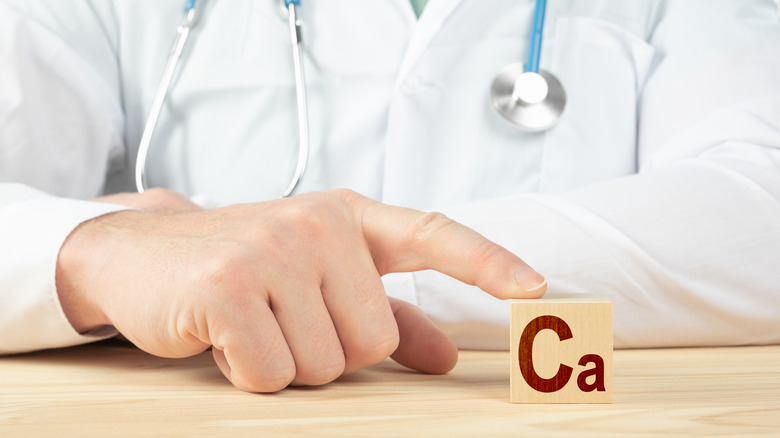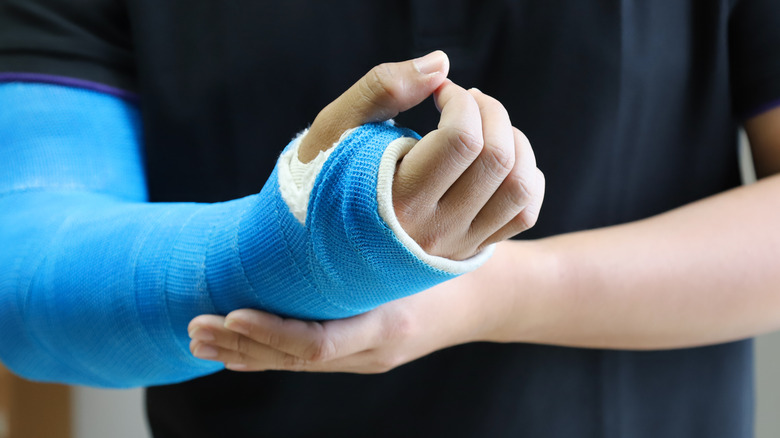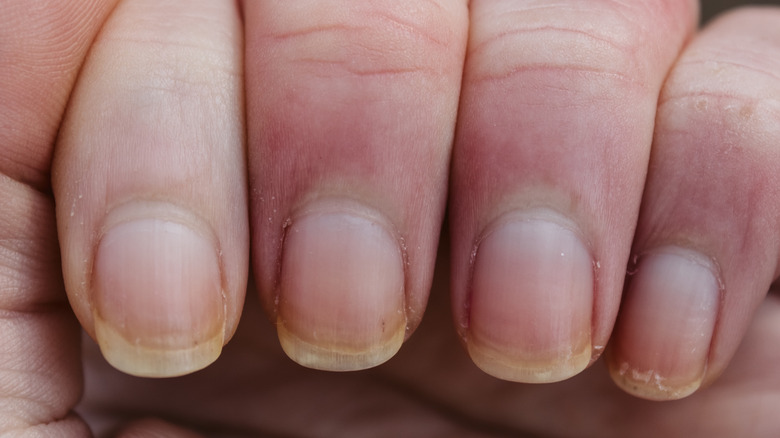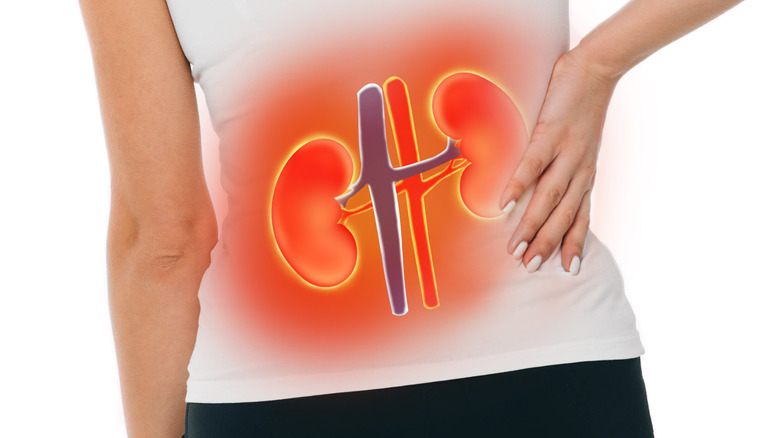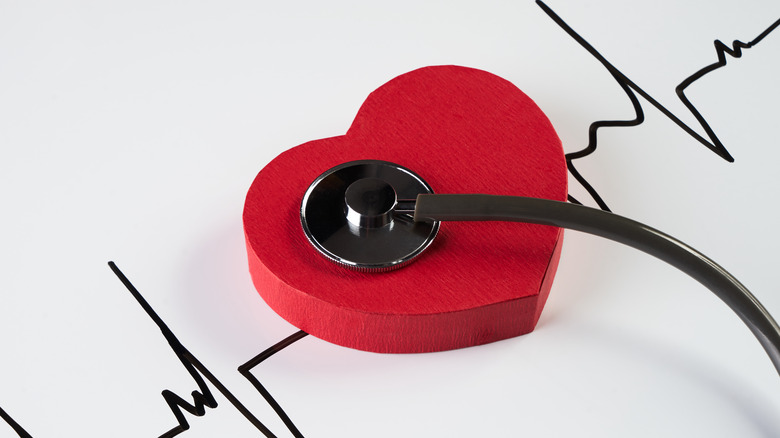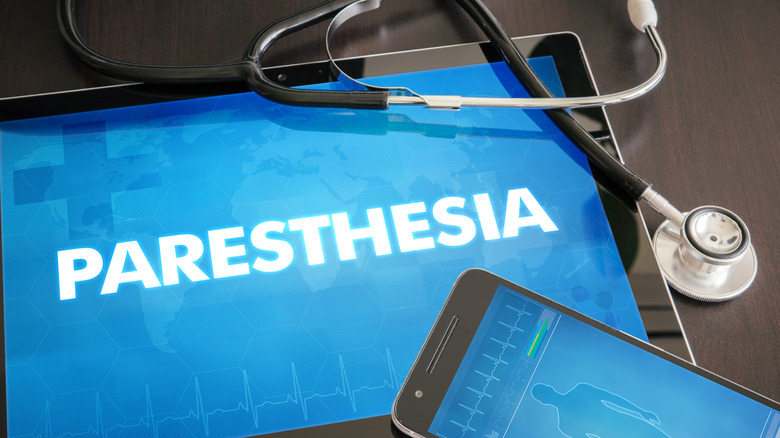You're Not Getting Enough Calcium If This Happens To You
Chances are, every time you shop for groceries, you see the word "calcium." In fact, it's become so commonplace that you might not even notice it anymore. After all, foods that advertise they've been fortified with calcium span well beyond cow's milk. With such wide availability, it's understandable if you take calcium a little bit for granted. Unfortunately, doing so can be potentially dangerous.
As Healthline explains, there are quite a few health concerns that can lead to hypocalcemia, better known as low calcium levels, in the body. Of course, your diet and whether or not you regularly take calcium supplements are influential factors. However, thyroid issues, menopause, or a large number of blood transfusions can impact calcium levels as well. In addition, certain medications, like corticosteroids and the kind used in chemotherapy, can decrease calcium in the body. Plus, you could be genetically predisposed to lower calcium levels than the average person.
Treating hypocalcemia is sometimes more complicated than just adding more diary products to your meals and snacks (via Healthline). The possible health issues that can develop from calcium deficiency can range from mild to life-threatening. However, this doesn't mean there aren't solutions, especially if you keep your healthcare provider in the loop when you experience potential symptoms of low calcium. Bottom line: Don't ignore your body's signals that you need more calcium, even if you think you're consuming enough.
Trouble speaking and breathing
Did you know that every time you breathe, you're involved in an abduction? You have 2 vocal cords in your throat, which move apart when you inhale and exhale (via Medical News Today). This movement is known as abduction. However, if your calcium levels dip too low, it can affect how your vocal cords move. This not only impacts your breathing, but also your ability to speak (via Healthline).
Adduction occurs when your vocal cords are pushed together (via Medical News Today and Healthline). In a nutshell, the vocal cords create a barrier that makes it harder to take in and release air from your lungs. Because air is necessary to create sounds, talking is also a greater challenge when your vocal cords are spasming. Fortunately, there is some good news.
As Medical News Today explains, laryngospasms usually last only about a minute. In cases where the vocal cords are not totally pushed together, allowing some air through, the spasms usually subside in a few minutes. Regardless, if you're experiencing laryngospasms, contact your healthcare provider right away. They can help you figure out the root cause of these spasms, in addition to checking your calcium levels.
Skin issues
When we think of nutrients that are good for our skin, vitamin E comes to mind. It can help keep skin healthy and youthful-looking, but don't sell calcium short when it comes to your skin's wellbeing.
According to Medical News Today, your skin can develop problems if your calcium levels don't just momentarily dip, but stay low. Specifically, you might develop either eczema or psoriasis, two skin conditions that look similar but are very different. For starters, eczema is known for being extremely itchy, while psoriasis is associated with more of a burning or stinging sensation (via WebMD). While both can cause scaliness, eczema tends to ooze, while psoriasis causes more inflammation. Where people tend to develop these conditions can vary, with eczema usually happening on joints, like the knees. Psoriasis can appear on, for example, the bottoms of someone's feet.
Despite the key differences between psoriasis and eczema, you should still make an appointment with a doctor or a dermatologist rather than try to guess which skin condition you've developed. Fortunately, there are treatment options, whether or not your psoriasis and eczema are caused by low calcium. One final note: Low calcium can also cause dry skin, so don't ignore any changes regarding your skin (via Medical News Today).
Weaker bones
Did you know that your bones could be weakening from low calcium levels without you realizing it? While you might feel something if your muscle health is off, it's unlikely you'll sense any difference walking, typing, or working out if your bones are becoming weaker — unless, of course, you experience a fracture. As the Mayo Clinic explains, not taking in enough calcium for decades can lead to a serious bone health issue called osteoporosis.
Because calcium is an essential nutrient for your bones, not having enough means your body doesn't have the basic materials it needs to keep your bones strong (via Mayo Clinic). Eventually, this can turn into osteoporosis, where your bones are actually brittle. Osteoporosis can leave one's bones so fragile that something as common as coughing could break them. Yes, you read that right, which means a bad fall (or a minor fall) could result in a trip to the emergency room.
If you suspect you or someone you know has osteoporosis, keep an eye out for other symptoms, like poor posture, back pain, and changes in height (via WebMD). If you're concerned with your calcium intake, try adding foods like tofu, spinach, and canned salmon to your diet. As always, speak with your healthcare provider about any and all health concerns, whether or not they're related to osteoporosis or your calcium levels.
Fatigue
Extreme tiredness is a common symptom of many health concerns, including low calcium (via Johns Hopkins Medicine). How much calcium you take in (including whether or not you take supplements) can impact your calcium levels. However, it is possible to maintain a healthy diet and vitamin regime and still have below normal calcium levels that cause fatigue.
As Johns Hopkins Medicine explains, you have 4 small glands in your neck that are extremely important when it comes to your calcium levels. Known as the parathyroid glands, they allow your body to make PTH, a hormone that helps manage how much calcium is in your blood. Unsurprisingly, if something goes wrong with these glands, your PTH levels can be thrown off. In turn, this can throw off your calcium levels (via Johns Hopkins). For example, even benign growths on these glands can drop your blood calcium levels, leaving you feeling exhausted.
In some cases, a person experiencing problems with their parathyroid glands might need to have at least 1 of these glands surgically removed (via Johns Hopkins). This operation is called a parathyroidectomy and can be the only course of action if the parathyroid gland or glands have malignant growths on them. However, a possible side effect of this procedure is low calcium levels that leave you constantly tired. For this reason, medical professionals sometimes recommend taking calcium supplements following a parathyroidectomy to help your body function normally while you recover from surgery.
Depression
It's important to remember everyone feels depressed from time to time. However, that momentary down feeling is not the same thing as the medical condition known as depression, which can be triggered by low calcium levels (via UCLA Health). If that's the case, how can anyone determine if a negative feeling is depression-related?
The truth is if you suspect you or someone else has depression, you should seek medical assistance. With that said, being able to recognize possible symptoms of depression is still important. Otherwise, you might not realize that outside help is available and may be necessary. Keep in mind that depression usually happens in episodes (via the Mayo Clinic). These episodes can involve difficulty sleeping, tiredness, indecision, and crying. In addition, a person with depression tends to spend less time with loved ones.
Although depression is treatable, that doesn't mean it isn't a serious medical concern. UCLA Health states that if you have low calcium levels and are experiencing depression, you should "... call your healthcare provider right away ..." As the Mayo Clinic points out, one of the signs of depression is "thoughts of self-harm or suicide." If you or anyone you know, has been having suicidal thoughts and/or taking suicidal actions, help is available. Visit https://www.samhsa.gov/find-help/suicide-prevention or contact SAMHSA's National Suicide Prevention Lifeline at 1-800-273-TALK (8255). And, as SAMHSA states on its website, don't be afraid to call 9-1-1, especially if you feel someone's life is in danger.
Hypotension
Often, we hear about the issues connected to high blood pressure, but blood pressure that dips too low is also dangerous. Clinically known as hypotension, this condition can be fatal when it's left untreated (via the Mayo Clinic). A major culprit behind low blood pressure is low calcium levels (via Oxford Medicine).
Remember, nutrients like calcium are important for all parts of your body. If you have hypocalcemia, your body's cells will react out of the need for calcium (via Oxford Medicine). The lower the calcium, the stronger the reaction, especially in the cells in your nerves and muscles. This can lead to issues with your cardiovascular system, like low blood pressure, which can cause a number of symptoms, including difficulty focusing, nausea, vision problems, extreme tiredness, and loss of consciousness (per Oxford Medicine and the Mayo Clinic).
While the general symptoms of hypotension need to be taken seriously, there's still one more possible complication from low blood pressure that should never be ignored: shock (via the Mayo Clinic). It's possible to go into shock from blood pressure problems brought on by low calcium levels, and make no mistake, shock can be fatal. If someone is confused and has an erratic pulse, clammy skin, and/or difficulty breathing, seek medical help right away.
Hallucinations
While it's possible to hallucinate from having a fever, it's also possible to have your senses trick you if your calcium levels drop too low. According to Tufts Medical Center, one of the symptoms of hypocalcemia (the medical term for low amounts of calcium in your body) is hallucinations. Specifically, Tufts focuses on 2 types of hallucinations when it comes to calcium: visual and auditory.
As WebMD explains, hallucinations, in general, can affect all 5 of your senses. A person experiencing a visual hallucination, for example, might look in the mirror and see flies walking across their forehead when there aren't any bugs near them. They might also see real things, but in a distorted way, both in terms of their general appearance and how they move. On the other hand, someone experiencing an auditory hallucination might hear voices. They could also think they're overhearing a conversation that isn't really happening.
Aside from auditory and visual hallucinations, a person can also have gustatory ones where food and beverages taste different for no reason. In other words, a person's tastebuds can help create a hallucination. In addition, a person might think they smell different when they don't (an olfactory hallucination) or could swear someone is tickling them when they're all by themselves (a tactile or somatic hallucination).
Convulsions
There is some confusion when it comes to this next possible sign of low calcium. As Medical News Today explains, the terms "convulsions" and "seizures" are sometimes thought of as the same thing. This is understandable, as a seizure can involve convulsing. However, it's possible to have convulsions without experiencing a seizure.
To clear up any confusion, it's important to understand what these 2 medical terms really mean. Convulsions are when your muscles contract or tighten, but not because you're consciously telling them to or your body is supposed to automatically (like when your heart beats) (via Medical News Today). When your muscles convulse, it's as if they've suddenly developed minds of their own and are behaving erratically. While this can be a symptom of a seizure, technically, an ailment is only considered a seizure if it involves the misfiring of electrical signals in the brain.
With all of that said, calcium deficiency can cause convulsions that can vary in scope and severity (via Healthline, National Institutes of Health, and Medical News Today). If someone starts convulsing, you should call 9-1-1, but there are a few things you can do while you wait for help (via Medical News Today and the Centers for Disease Control and Prevention). Carefully place the person on their side on the floor, and put a pillow or a makeshift pillow (like a rolled-up jacket) under their head. Also, make sure they don't have anything around their neck.
Brittle nails
Two women go to a salon for a mani-pedi. The first woman complains that her nails are constantly breaking, no matter what she does. Her friend recommends a clear polish that claims it makes nails stronger. A month later, the two meet up again, but the one woman's nails are still breaking, despite using the polish. Could this nail care product not work as well as advertised? Possibly, but if this woman has low calcium, no topical solution will be enough to give her the results she wants.
As Medical News Today explains, not only can low levels of calcium change your nails, but it can also sometimes be the first red flag that your body needs calcium. Besides being brittle, you might notice that your nails are not growing as quickly as they normally would if your calcium is too low. While this isn't as dangerous a concern compared to other symptoms, like seizures, having brittle nails can make you more susceptible to fungal infections.
Although weaker nails can be the result of calcium deficiency, the American Osteopathic College of Dermatology (AOCD) cites iron as opposed to calcium as the more likely culprit (via Medical News Today). In addition, the AOCD also states that surface nail care, rather than nutritional factors, is more likely to make nails brittle. Nevertheless, if you have concerns that your nails could be warning you about larger health problems, speak with your healthcare provider.
Kidney problems
When your calcium is low, you have a condition called hypocalcemia (via MedlinePlus). However, there is a specific type of hypocalcemia that starts with one's genes and can adversely affect the kidneys (via MedlinePlus and the Frontiers in Physiology). To see how all the dots of this condition connect, we're going to have to dive a little into human biology.
As the 2016 study published in Frontiers in Physiology explains, our bodies are equipped to detect when our calcium levels are out of whack. We do this through our calcium-detecting receptor (CASR). For example, if our calcium levels are too high, the CASR triggers our kidneys to filter more calcium from our bloodstream so it can be removed from the body. However, genetic mutations in the CASR can lead to autosomal dominant hypocalcemia where the CASR does not properly manage calcium levels. As a result, your kidneys could wind up filtering too much calcium, creating the perfect conditions for developing kidney stones (via MedlinePlus). Even if kidney stones don't form, just having higher than normal amounts of calcium in the kidneys can cause damage.
Unfortunately, as MedlinePlus explains, autosomal dominant hypocalcemia sometimes goes hand-in-hand with another group of kidney disorders. Collectively known as Bartter syndrome, these ailments vary when it comes to symptoms and rate of fatality (via MedlinePlus). However, a few possible health issues caused by them include the kidneys becoming harder, bones becoming weaker, and hearing loss.
Dental issues
Think of the structure of a skeleton. What comes to mind? In all likelihood, the first thing you thought of was bones, which are impacted by calcium deficiency. However, teeth are also a part of a skeleton, and like bones, they can be damaged by low calcium levels.
As Doctor of Dental Surgery Michael G. Landy explains, a major building block of enamel is crystalline calcium phosphate. As its name suggests, calcium is crucial in order for your body to generate this substance, and make no mistake, your teeth need enamel. It's their suit of armor that keeps them safe, strong, and healthy (via WebMD). In fact, enamel that has worn away can lead to cavities over time, tooth decay, abscesses, and even infections. However, this is only one way that low calcium can affect your oral health.
Remember, the reason why teeth are part of a skeleton is because they are embedded into our jawbone (via Michael G. Landy). If we don't have enough calcium, our bodies will not have a basic building block it needs to keep building and rebuilding our bones, including the ones in our jaws. This means our teeth have less to grip onto, increasing the chances of them falling out or, at the very least, becoming loose.
Seizures
Arguably, one of the more severe symptoms of hypocalcemia (or low levels of calcium), is seizures (via the Epilepsy Foundation). Remember, your brain communicates to the rest of your body through electrical signals, but when something alters these signals, it can lead to a seizure (via Healthline). This can result in convulsing and your muscles contracting erratically (via Oxford Medicine).
Although convulsions are a common symptom of a seizure, there are a number of other red flags associated with this condition. As Healthline and the Centers for Disease Control and Prevention note, a person might experience a headache, vision issues, queasiness, anxiousness, dizziness, or even a feeling of déjà vu just prior to a seizure. Once they actually start having the seizure, their eyes might start moving around quickly, they might start drooling uncontrollably, and can even fall and pass out. In addition, they might wet or soil themselves, grunt, and/or clench their teeth.
Although the symptoms of seizures can be severe, it is possible to have a seizure and show no symptoms at all (via Healthline). Regardless of whether a seizure is calcium-related or not, don't hesitate to call 9-1-1 if you witness someone having a seizure. Remember, this is a serious medical issue that can do lasting damage, especially if there is a delay in getting help.
Arrhythmias
Within the medical term, "arrhythmias," is the word "rhythm." This makes perfect sense, as arrhythmia is when your heartbeat's natural rhythm is thrown off (via Healthline). Now, keep in mind, these aren't normal fluctuations that happen to one's pulse because of exercise or stress. Arrhythmias are a type of disorder that can be brought on by low amounts of calcium in your body.
According to Healthline, arrhythmias can involve the heart beating too fast or too slow. It can also affect how the heart muscle contracts. To draw a comparison, when you breathe, you inhale and exhale. Now, imagine if your lungs' timing was off, and they tried to exhale when they should be inhaling or vice-versa. Just as your lungs need to take in and release air at the right moments, your heart muscle needs to tighten and relax at the right time to function properly. Unsurprisingly, a person with arrhythmias can develop a very irregular heart rate.
While it is possible to have an arrhythmia and not experience any symptoms, certain ones are severe enough that they require medical attention immediately (via Healthline). These include extreme exhaustion, perspiration, discomfort in the chest, dizziness, breathing issues, and a general sense of weakness. A person with an arrhythmia might also feel faint but not necessarily lose consciousness. Just the faintness, however, is enough reason to seek emergency services.
Tingling sensation and numbness
Anyone who has accidentally fallen asleep on their arm can tell you all about paresthesia — even if they've never heard the term before. As the University of Rochester Medical Center explains, it's the medical condition where you feel like you have "pins and needles" in a part of your body. Have you ever wondered why this odd feeling happens?
In a nutshell, paresthesia has to do with your nervous system not transmitting signals the way it normally would (via the University of Rochester Medical Center). As a result, you might feel a numb or prickly sensation. Now, if you sit on your foot or lean on your arm, you'll probably eventually give yourself a temporary case of paresthesia. If you're experiencing numbness, pin-and-needles, or a burning sensation for no apparent reason, however, it could be that your calcium levels are low and have been for quite some time (via Verywell Health and Medical News Today).
While we normally think of paresthesia affecting only certain areas of our bodies, technically, it can happen anywhere (via Medical News Today). In addition, it can cause other sensations that we don't usually associate with the condition, such as itchiness and achiness. Paresthesia can also vary from person to person, with some feeling it all the time, while others experience an on-and-off version of it.

